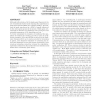Free Online Productivity Tools
i2Speak
i2Symbol
i2OCR
iTex2Img
iWeb2Print
iWeb2Shot
i2Type
iPdf2Split
iPdf2Merge
i2Bopomofo
i2Arabic
i2Style
i2Image
i2PDF
iLatex2Rtf
Sci2ools
121
click to vote
ATAL
2003
Springer
2003
Springer
A selection-mutation model for q-learning in multi-agent systems
Although well understood in the single-agent framework, the use of traditional reinforcement learning (RL) algorithms in multi-agent systems (MAS) is not always justified. The feedback an agent experiences in a MAS, is usually influenced by the other agents present in the system. Multi agent environments are therefore non-stationary and convergence and optimality guarantees of RL algorithms are lost. To better understand the dynamics of traditional RL algorithms we analyze the learning process in terms of evolutionary dynamics. More specifically we show how the Replicator Dynamics (RD) can be used as a model for Q-learning in games. The dynamical equations of Q-learning are derived and illustrated by some well chosen experiments. Both reveal an interesting connection between the exploitationexploration scheme from RL and the selection-mutation mechanisms from evolutionary game theory. Categories and Subject Descriptors I.2 [Artificial Intelligence]: Learning General Terms Theory, ...
| Added | 06 Jul 2010 |
| Updated | 06 Jul 2010 |
| Type | Conference |
| Year | 2003 |
| Where | ATAL |
| Authors | Karl Tuyls, Katja Verbeeck, Tom Lenaerts |
Comments (0)

